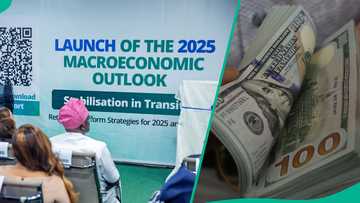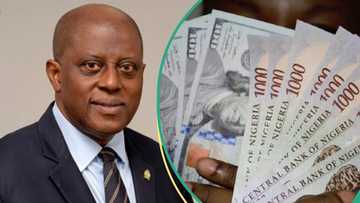CBN Shares Plan for 2025, Lists Forex, Remittance, Others
- CBN intends to build on its achievements in remittances, diaspora involvement, foreign exchange market reform, and other
- This is as 14 new foreign money transfer companies have received preliminary permission from the CBN recently
- In addition, Electronic Foreign Exchange Matching System and other policies were introduced last year
Legit.ng journalist Zainab Iwayemi has 5-year-experience covering the Economy, Technology, and Capital Market.
Olayemi Cardoso, governor of the Central Bank of Nigeria, has said that in 2025, the apex regulator plans to consolidate the progress it has made in reforming the foreign exchange market, remittances, diaspora participation, and other areas.

Source: Getty Images
Cardoso made this claim on Thursday in a statement uploaded on his X handle, which was reshared on the Central Bank of Nigeria's official X handle, @cenbank.
The Electronic Foreign Exchange Matching System, which was introduced last year as part of the CBN's several attempts to stabilize the naira, has increased market transparency.
In order to encourage diaspora remittances through formal channels, the CBN has also given approval in principle to 14 new international money transfer companies.
On Thursday, Cardoso said,
“By engaging transparently with stakeholders – from local communities to international partners – we bolstered Nigeria’s credibility at the global level while addressing our nation’s unique challenges. These efforts included decisive action: clearing the verified FX commitments, which amounted to $7bn, discontinuing the Central Bank’s quasi-fiscal interventions, unifying the multiple exchange rate windows, etc.
“Furthermore, we introduced innovative policies and reforms across a range of areas: from the FX market and remittances to financial inclusion, diaspora engagement, compliance, private sector growth, and more.
“We also prioritised increasing investor confidence, enhancing the efficiency of our financial markets, and driving innovation across sectors. As a result of these policies and reforms, foreign capital imported into the country rose by over $6bn in 2024, and Nigeria’s external reserves have risen to over $40bn, reflecting the growing confidence in our economy.
“This year, the CBN will build on this momentum, implementing sound monetary policies to safeguard our economic future, strengthening regulatory frameworks to inspire stability and confidence, and advancing initiatives that drive prosperity for all.
The regulator's announcement in March 2024 of the banking sector's recapitalization was motivated by the desire to help President Bola Tinubu's $1 trillion economic ambition.
Speaking on the new capital requirement, Charles Abuede, a financial analyst told Legit.ng,
"The move to increase banks' minimum capital requirement is not a bad idea, considering that it would have significant growth impact on the banking industry as a result of more investments, which could come in form of foreign direct investments or investments from the domestic front."
Meanwhile, in the third quarter of 2024, a notable decrease in invisible transactions caused a decline in foreign exchange demand.
This was mentioned in the Central Bank of Nigeria's most recent quarterly statistical bulletin, which was posted online.
Medical costs, school fees, student maintenance allowances, and other eligible non-physical transactions are examples of invisible transactions.
Nigeria’s external reserves falls amid debt repayment
Legit.ng reported that Nigeria’s external reserves grew in the past year but have declined sharply due to external debt servicing.
Data from the Central Bank of Nigeria (CBN) shows that Nigeria’s external reserves fell by $320 million, a 0.8 decline in two weeks.
As of January 13, 2025, the reserves stood at about $40.56 billion, relative to $40.88 billion on January 2, 2025.
PAY ATTENTION: Сheck out news that is picked exactly for YOU ➡️ find the “Recommended for you” block on the home page and enjoy!
Source: Legit.ng




